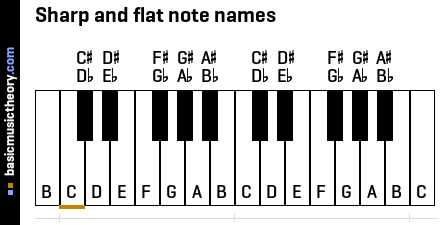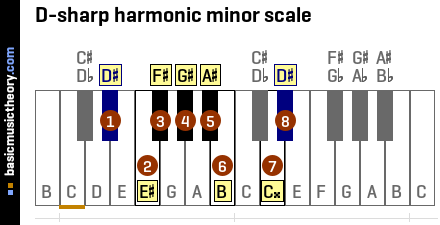D-sharp harmonic minor key signature
The Solution below shows the D# harmonic minor key signature on the treble clef and bass clef.
The Lesson steps then explain how to write the key signature using both clefs, including the display order and line / space staff positions of the notes, and the sharp / flat accidentals.
For a quick summary of this topic, have a look at Key signature.
| Key | C | C# | Db | D | [D#] | Eb | E | E# | Fb | F | F# | Gb | G | G# | Ab | A | A# | Bb | B | B# | Cb | All On 1 page |
|---|
Solution
1. D-sharp harmonic minor key signature
The D-sharp harmonic minor scale has 5 sharps, 1 double-sharp.
| No. | 1 | 2 | 3 | 4 | 5 | 6 | 7 | 8 |
|---|---|---|---|---|---|---|---|---|
| Note | D# | E# | F# | G# | A# | B | C## | D# |
This harmonic minor scale is based on the natural minor scale with the same key / tonic note - D# natural minor scale.
Since the natural minor key is itself on the Circle of 5ths - D# minor on circle of 5ths, this means that this is a commonly used harmonic minor scale key.
This scale sounds the same as the Eb harmonic minor scale, which is also a commonly used scale. The same notes are played in the same order in each scale - they sound identical. Only the names of the individual notes are different.
These note names are shown below on the treble clef followed by the bass clef.


| Bass Clef: | Midi | MP3 | Treble Clef: | Midi | MP3 |
Lesson steps
1. Piano key note names
The white keys are named using the alphabetic letters A, B, C, D, E, F, and G, which is a pattern that repeats up the piano keyboard.
Every white or black key could have a flat(b) or sharp(#) accidental name, depending on how that note is used. In a later step, if sharp or flat notes are used, the exact accidental names will be chosen.

The audio files below play every note shown on the piano above, so middle C (marked with an orange line at the bottom) is the 2nd note heard.
| Bass Clef: | Midi | MP3 | Treble Clef: | Midi | MP3 |
2. D-sharp harmonic minor notes
The D# harmonic minor scale has 5 sharps, 1 double-sharp.
For the major and natural minor scales, no more information is needed to write the key signature. Just put the correct number of sharp or flat symbols next to the treble clef.
However, harmonic minor key signatures use the natural minor key signature of the same key (in this case - D# natural minor key signature) next to the treble clef, and then the differences between the two scales are shown as adjustments next to the note names on the staff.
Firstly, in this step, the harmonic minor scale is shown on a piano keyboard. Now compare this to the next step showing the natural minor scale (specifically the 7th note).
| No. | 1 | 2 | 3 | 4 | 5 | 6 | 7 | 8 |
|---|---|---|---|---|---|---|---|---|
| Note | D# | E# | F# | G# | A# | B | C## | D# |

To understand why the D-sharp harmonic minor scale has 5 sharps, 1 double-sharp, have a look at the D# harmonic minor scale page, which shows the music theory rules for identifying the note positions and names for this scale.
| Bass Clef: | Midi | MP3 | Treble Clef: | Midi | MP3 |
3. D-sharp minor key signature
The D# natural minor key signature has 6 sharps, which is different to the harmonic minor scale above.
| No. | 1 | 2 | 3 | 4 | 5 | 6 | 7 | 8 |
|---|---|---|---|---|---|---|---|---|
| Note | D# | E# | F# | G# | A# | B | C# | D# |


To calculate the D-sharp harmonic minor scale from the D# natural minor scale, the 7th note position of the natural minor scale - note C# is raised by one half-tone / semitone, as shown in the next step.
However, the harmonic minor key signature next to the bass or treble clef will not reflect this raised note, as explained in the next step.
| Bass Clef: | Midi | MP3 | Treble Clef: | Midi | MP3 |
4. D-sharp harmonic minor key signature adjustments
Below is a table showing the note name adjustments that describe the difference between this harmonic scale note and the natural minor scale, whose key signature it uses.
The 7th note of the natural minor scale needs to be raised by one half-tone / semitone, which will result in adjustment action on the existing natural minor note name.
| No | Natural minor note name | Harmonic minor note name | Adjustment action | Adjustment name |
|---|---|---|---|---|
| 1 | D# | D# | None | Same |
| 2 | E# | E# | None | Same |
| 3 | F# | F# | None | Same |
| 4 | G# | G# | None | Same |
| 5 | A# | A# | None | Same |
| 6 | B | B | None | Same |
| 7 | C# | C## | Raised | Double Sharp |
| 8 | D# | D# | None | Same |


The natural minor key signature of the bass or treble clef is used, with the differences between the two scales shown as adjustments next to the note names on the staff, not in the key signature itself.
| Bass Clef: | Midi | MP3 | Treble Clef: | Midi | MP3 |
| Key | C | C# | Db | D | [D#] | Eb | E | E# | Fb | F | F# | Gb | G | G# | Ab | A | A# | Bb | B | B# | Cb | All On 1 page |
|---|